Quantum mechanics redefines information and its fundamental properties. Researchers at Perimeter Institute work to understand the properties of quantum information and study which information processing tasks are feasible, and which are infeasible or impossible. This includes research in quantum cryptography, which studies the trade-off between information extraction and disturbance, and its applications. It also includes research in quantum error correction, which involves the study of methods for protecting information against decoherence. Another important side of the field is studying the application of quantum information techniques and insights to other areas of physics, including quantum foundations and condensed matter.
Format results
-
29 talks-Collection NumberC25024
Talk
-

Opening Remarks
-
Marcela Carena Perimeter Institute for Theoretical Physics
-
Emily Petroff Perimeter Institute for Theoretical Physics
-
Chris Waddell Perimeter Institute for Theoretical Physics
-
-

-

Chaos and the Emergence of the Cosmological Horizon
David Kolchmeyer Massachusetts Institute of Technology
-

Operator Algebras and Third Quantization
Nima Lashkari Purdue University West Lafayette
-

Swing Surfaces in AdS/CFT
Sabrina Pasterski Perimeter Institute for Theoretical Physics
-

An Emergent Area Operator in 2d CFT
Ronak Soni Chennai Mathematical Institute
-

Gravity As An Oracle (Vision Talk)
Raphael Bousso University of California, Berkeley
-

Vacuogenesis (Vision Talk)
Ted Jacobson University of Maryland, College Park
-
-
Quantum Information (Elective), PHYS 635, February 24 - March 28, 2025
13 talks-Collection NumberC25006Talk
-

-

Lecture - Quantum Information, PHYS 635
Alex May Perimeter Institute for Theoretical Physics
-

Lecture - Quantum Information, PHYS 635
Alex May Perimeter Institute for Theoretical Physics
-

Lecture - Quantum Information, PHYS 635
Alex May Perimeter Institute for Theoretical Physics
-

Lecture - Quantum Information, PHYS 635
Alex May Perimeter Institute for Theoretical Physics
-

Lecture - Quantum Information, PHYS 635
Alex May Perimeter Institute for Theoretical Physics
-

Lecture - Quantum Information, PHYS 635
Alex May Perimeter Institute for Theoretical Physics
-

Lecture - Quantum Information, PHYS 635
Alex May Perimeter Institute for Theoretical Physics
-
-
Waterloo-Munich Joint Workshop
21 talks-Collection NumberC24002Talk
-

Opening Remarks
-
Sonya Gzyl Max Planck Institute of Quantum Optics
-
Timothy Hsieh Perimeter Institute for Theoretical Physics
-
-

-

-

Towards large-scale quantum simulations with trapped ions - Rajibul Islam
Kazi-Rajibul Islam Institute for Quantum Computing (IQC)
-

-

-

-

-
-
Causalworlds
63 talks-Collection NumberC24018Talk
-

-

Tutorial: Causal Inference Meets Quantum Physics
Robert Spekkens Perimeter Institute for Theoretical Physics
-

Counterfactual and Graphical Frameworks for Causal Modeling
Thomas Richardson University of Washington
-

-

Modeling Latent Selection with Structural Causal Models
Leihao Chen University of Amsterdam, Korteweg-de Vries Institute for Mathematics
-

Relating Wigner's Friend Scenarios to Nonclassical Causal Compatibility, Monogamy Relations, and Fine Tuning
Yìlè Yīng Perimeter Institute for Theoretical Physics
-

Zero Inflation as a Missing Data Problem: a Proxy-based Approach
Trung Phung Johns Hopkins Whiting School of Engineering
-

-
-
Physics of Quantum Information
20 talks-Collection NumberC24017Talk
-

-

Repetition Code Revisited
Matthew Fisher University of California, Santa Barbara
-

-

Stability of mixed-state quantum phases via finite Markov length
Shengqi Sang Stanford University
-

The rise and fall of mixed-state entanglement: measurement, feedback, and decoherence
Tsung-Cheng Lu (Peter) University of Maryland, College Park
-

Universal bound on topological gap
Liang Fu Massachusetts Institute of Technology (MIT) - Department of Physics
-

Mapping ground states to string-nets
Daniel Ranard California Institute of Technology (Caltech)
-

Sequential Quantum Circuit
Xie Chen California Institute of Technology
-
-
Foundations of Quantum Computational Advantage
21 talks-Collection NumberC24020Talk
-

-

Values for compiled XOR nonlocal games
Connor Paddock University of Ottawa
-

Reliable quantum computational advantages from quantum simulation
Juani Bermejo Vega University of Granada
-

-

-

-

-

-
-
Quantum Information 2023/24
13 talks-Collection NumberC24012Talk
-

Quantum Information Lecture
Eduardo Martin-Martinez University of Waterloo
-

Quantum Information Lecture
Eduardo Martin-Martinez University of Waterloo
-

Quantum Information Lecture
Eduardo Martin-Martinez University of Waterloo
-

Quantum Information Lecture
Eduardo Martin-Martinez University of Waterloo
-

Quantum Information Lecture
Eduardo Martin-Martinez University of Waterloo
-

Quantum Information Lecture
Eduardo Martin-Martinez University of Waterloo
-

Quantum Information Lecture
Eduardo Martin-Martinez University of Waterloo
-

Quantum Information Lecture
Eduardo Martin-Martinez University of Waterloo
-
-
QPV 2023: Advances in quantum position verification
12 talks-Collection NumberC23037Talk
-

-

QPV: An Overview and Reflections
Harry Buhrman Centrum Wiskunde & Informatica
-

Popescu-Rohrlich correlations imply efficient instantaneous nonlocal quantum computation
Anne Broadbent University of Ottawa
PIRSA:23090023 -

Non-local quantum computation meets quantum gravity
Alex May Perimeter Institute for Theoretical Physics
-

Quantum Error-Correction and Holographic Task
Beni Yoshida Perimeter Institute for Theoretical Physics
-

-

Protocols and Implementations of Quantum Position Verification
-
Eric Chitambar University of Illinois Urbana-Champaign
-
Paul Kwiat University of Illinois
-
-

-
-
New Frontiers in Machine Learning and Quantum
10 talks-Collection NumberC22034Talk
-

Quantum adiabatic speedup on a class of combinatorial optimization problems
-
Madelyn Cain Harvard University
- Madelyn Cain
-
-

Towards an artificial Muse for new ideas in Quantum Physics
Mario Krenn Max Planck Institute for the Science of Light
-

-

Self-Correcting Quantum Many-Body Control using Reinforcement Learning with Tensor Networks
Friederike Metz L'Ecole Polytechnique Federale de Lausanne (EPFL)
-

A Study of Neural Network Field Theories
Anindita Maiti Perimeter Institute for Theoretical Physics
-

-

Representing quantum states with spiking neural networks
-
Stefanie Czischek University of Ottawa
- Stefanie Czischek
-
-

Adaptive Quantum State Tomography with Active Learning
Hannah Lange Ludwig-Maximilians-Universität München (LMU)
-
-
Cold Atom Molecule Interactions (CATMIN)
22 talks-Collection NumberC22028Talk
-

Introduction & Welcoming Remarks
James Shaffer Quantum Valley Ideas Laboratories
-

Perimeter Greeting
Paul Smith Perimeter Institute for Theoretical Physics
-

-

Indirect spin-spin interactions with Rydberg molecules
Hossein Sadeghpour Harvard University
-

-

-

Polyatomic ultralong range Rydberg molecules
Rosario Gonzalez-Ferez University of Granada
-

Observation of linewidth narrowing in EIT polarization spectroscopy involving hot Rydberg atoms with Laguerre Gaussian modes
Luis Marcassa Universidade Estadual Paulista (UNESP)
-
-
Quantum Information 2021/2022
10 talks-Collection NumberC22016Talk
-

Quantum Information 2021/2022
-
Eduardo Martin-Martinez University of Waterloo
-
Philippe Allard Guerin Austrian Academy of Sciences
PIRSA:22020073 -
-

Quantum Information 2021/2022
-
Eduardo Martin-Martinez University of Waterloo
-
Philippe Allard Guerin Austrian Academy of Sciences
PIRSA:22030073 -
-

Quantum Information 2021/2022
-
Eduardo Martin-Martinez University of Waterloo
-
Philippe Allard Guerin Austrian Academy of Sciences
PIRSA:22030074 -
-

Quantum Information 2021/2022
-
Eduardo Martin-Martinez University of Waterloo
-
Philippe Allard Guerin Austrian Academy of Sciences
PIRSA:22030075 -
-

Quantum Information 2021/2022
-
Eduardo Martin-Martinez University of Waterloo
-
Philippe Allard Guerin Austrian Academy of Sciences
PIRSA:22030076 -
-

Quantum Information 2021/2022
-
Eduardo Martin-Martinez University of Waterloo
-
Philippe Allard Guerin Austrian Academy of Sciences
PIRSA:22030077 -
-

Quantum Information 2021/2022
-
Eduardo Martin-Martinez University of Waterloo
-
Philippe Allard Guerin Austrian Academy of Sciences
PIRSA:22030078 -
-

Quantum Information 2021/2022
-
Eduardo Martin-Martinez University of Waterloo
-
Philippe Allard Guerin Austrian Academy of Sciences
PIRSA:22030079 -
-
-
Quantum Gravity 2020
22 talks-Collection NumberC20031Talk
-

Welcome and Opening Remarks
Bianca Dittrich Perimeter Institute for Theoretical Physics
-

Approaches to Quantum Gravity: Key Achievements and Open Issues
Hermann Nicolai Max-Planck-Institut für Gravitationsphysik
-

Quantum gravity from the loop perspective
Alejandro Perez Aix-Marseille University
-

Lessons for quantum gravity from quantum information theory
Daniel Harlow Massachusetts Institute of Technology (MIT)
-

Understanding of QG from string theory
Herman Verlinde Princeton University
-

Progress in horizon thermodynamics
Aron Wall University of Cambridge
-

Asymptotically Safe Amplitudes from the Quantum Effective Action
Frank Saueressig Radboud Universiteit Nijmegen
-

The Remarkable Roundness of the Quantum Universe
Renate Loll Radboud Universiteit Nijmegen
-
-
QIQG 2025
29 talks-Collection NumberC25024
QIQG 2025: Quantum Information in Quantum Gravity
QIQG 2025: Quantum Information In Quantum Gravity will unite researchers working at the intersection of quantum information theory and quantum gravity, to exchange insights and showcase recent developments bridging these fields. As part of the celebrations of Perimeter’s 25th anniversary, we will also feature vision talks by world-leading experts exploring pivotal and emerging themes at the nexus of quantum information and quantum gravity. Our program will span topics such as:- Algebraic approaches to field theory and gravity
- Observers, quantum reference frames, and relational observables
- Quantum focussing and the Generalized Second Law
- SYK and its double-scaled limit
- The quantum information theoretic structure of spacetime
- Edge modes and entanglement entropy across subregions
- The role of complexity in field theory and gravity
- The black-hole information puzzle and related issues
- Quantum error-correcting codes in quantum field theory and quantum gravity
- Quantum cryptography and its implications for gravity
- Gravitational wormholes and their information-theoretic implications
- Chaos and thermalization in many-body systems and their realization in quantum gravity
- Holographic cosmology and de Sitter space
:: :: ::
Scientific Organizers
Luca Ciambelli (Perimeter Institute)
Rob Myers (Perimeter Institute)
Chris Waddell (Perimeter Institute)
Beni Yoshida (Perimeter Institute)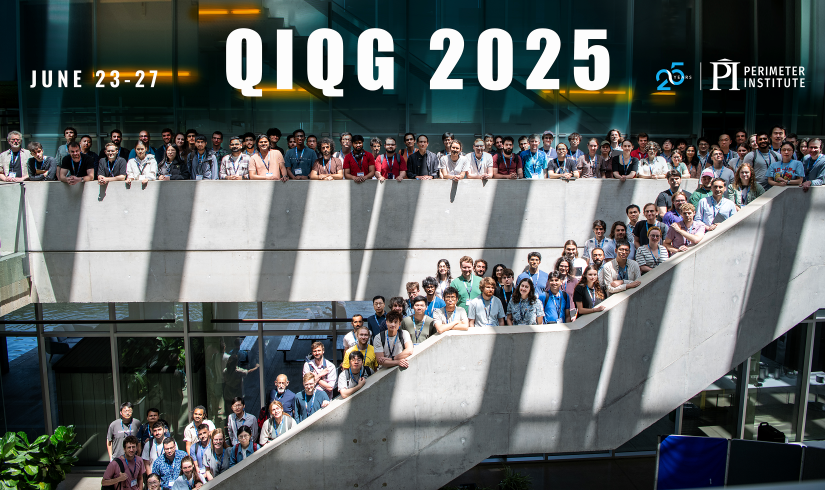
-
Quantum Information (Elective), PHYS 635, February 24 - March 28, 2025
13 talks-Collection NumberC25006We look to understand the possibilities and limits of quantum information processing, and how an information theory perspective can inform theoretical physics. Topics covered include: entanglement, tools for measuring nearness of quantum states, characterizing the most general possible quantum operations, entropy and measuring information, the stabilizer formalism, quantum error-correcting codes, the theory of computation, quantum algorithms, classical and quantum complexity. Instructor: Alex May/Bindiya Arora Students who are not part of the PSI MSc program should review enrollment and course format information here: https://perimeterinstitute.ca/graduate-courses -
Waterloo-Munich Joint Workshop
21 talks-Collection NumberC24002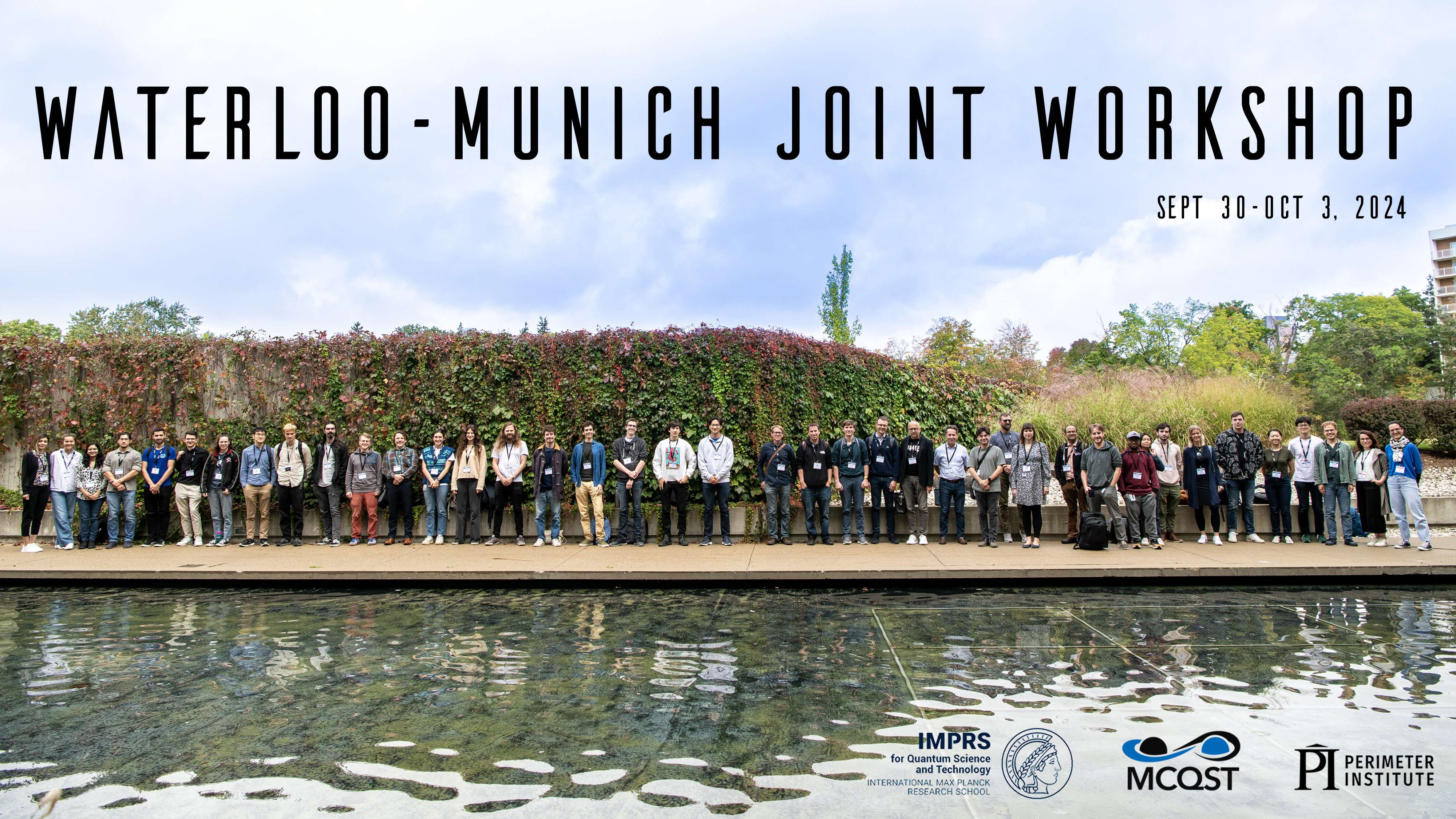
Join us for a pioneering joint workshop between renowned research institutions in Munich and Waterloo! This exciting event will focus on the topic of quantum simulation, with additional talks delving into various subjects of quantum science and technology. Designed to include researchers across different levels, from group leaders, postdoctoral fellows, and PhD students, this inaugural collaboration aims to unite scientists from both locations, fostering valuable networking opportunities and promoting interdisciplinary collaboration. Don't miss this extraordinary opportunity to connect, exchange ideas, and shape the future of quantum research together!

-
Causalworlds
63 talks-Collection NumberC24018Understanding causality is fundamental to science and inspires wide-ranging applications, yet there are several distinct notions of causation. Recently, there have been important developments on the role of causality in quantum physics, relativistic physics and their interplay. These have unearthed a plethora of fascinating open questions regarding the nature of causation, emergence of space-time structure and the limits of quantum information processing. At the same time, causal reasoning has become an important tool in machine learning and statistics, with applications ranging from big data to healthcare. This conference brings together experts from different areas of physics working on questions related to causality, as well as selected researchers who bridge the gap between fundamental research and current industrial applications. The aim of the conference is to provide a venue for cross-pollination of these ideas through scientific exchange between these communities. The conference will focus on the following facets of causality:
• Quantum and classical causal inference
• Indefinite causal order and quantum reference frames
• Causality in quantum field theory and quantum gravity
• Experiments and applications of causality

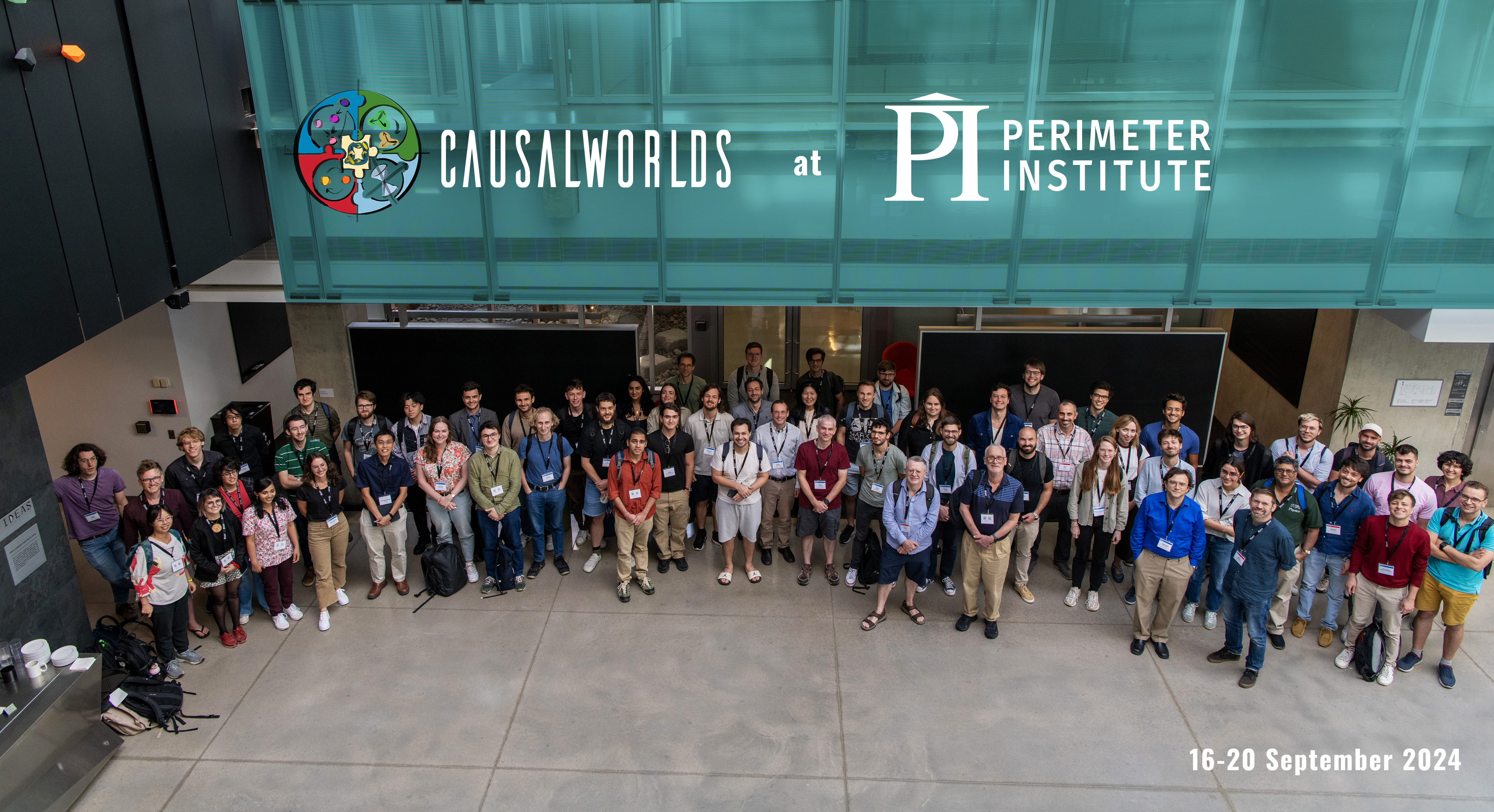
:: :: ::
Important dates
Paper submission deadline: 24 May 2024 // 31 May 2024
Paper notification: 3 July 2024 Registration deadline (with application for financial assistance): 18 July 2024
Registration deadline: 28 August 2024
Conference: 16-20 September 2024 Update: The submission deadline has been extended to 31st May 2024 for
papers which clearly justify their relevance for the following three
topics: 1) classical causal inference, 2) causality in relativistic physics (including quantum field theory and quantum gravity) and 3) experiments in causality. As we have received a sufficiently high number of submissions on the remaining topics (particularly indefinite causality and quantum causal models), the original deadline of 24th May still holds for submissions in this category. :: :: ::
Call for Abstracts
Prospective speakers can submit a paper for a contributed talk (in person or online) and/or a poster (in person only) via the Call for Abstracts. The Call for Abstracts is now open! Submissions for a talk will automatically be considered for a poster if not accepted for a talk.:: :: ::
Invited Speakers
Jessica Bavaresco (University of Geneva)
Cyril Branciard (CNRS, University Grenoble Alpes)
Rafael Chaves (Federal University of Rio Grande do Norte)
Giulio Chiribella (The University of Hong Kong)
Doreen Fraser (University of Waterloo)
Anne-Catherine de la Hamette (IQOQI Vienna)
Ciarán Lee (Spotify)
Tein van der Lugt (University of Oxford)
Joris M. Mooij (University of Amsterdam)
Mio Murao (University of Tokyo)
Alejandro Pozas-Kerstjens (University of Geneva)
Huw Price (Trinity College, Cambridge)
Renato Renner (ETH Zürich)
Thomas Richardson (University of Washington)
Sally Shrapnel (The University of Queensland)
Sumati Surya (Raman Research Institute)
Rainer Verch (University of Leipzig)
:: :: ::
Programme Committee
V Vilasini (ETH Zürich & Inria, University Grenoble Alpes) (PC Chair)
Augustin Vanrietvelde (Télécom Paris) (PC Co-chair)
Alastair Abbott (Inria, University Grenoble Alpes)
Časlav Brukner (IQOQI Vienna & University of Vienna)
Eric Cavalcanti (Griffith University)
Chris Fewster (University of York)
Lucien Hardy (Perimeter Institute)
Hlér Kristjánsson (Perimeter Institute & IQC & Université de Montréal)
Giulia Rubino (University of Bristol)
Nitica Sakharwade (Università degli Studi di Napoli Federico II)
Robert Spekkens (Perimeter Institute)
Jacopo Surace (Perimeter Institute)
Elie Wolfe (Perimeter Institute)
Lin-Qing Chen (ETH Zürich & IQOQI Vienna)
Hippolyte Dourdent (ICFO Barcelona)
Tamal Guha (University of Hong Kong)
Robin Lorenz (Quantinuum, Oxford)
Maria Papageorgiou (IQOQI Vienna)
Nicola Pinzani (Université libre de Bruxelles)
Marco-Túlio Quintino (Sorbonne Université, Paris)
Marc-Olivier Renou (Inria Paris-Saclay & CPHT, École polytechnique)
David Schmid (ICTQT, University of Gdańsk)
John Selby (ICTQT, University of Gdańsk)
Akihito Soeda (National Institute of Informatics, Tokyo)
Matthew Wilson (University College London)
:: :: ::
Scientific Organizers
Hlér Kristjánsson (Perimeter Institute & IQC & Université de Montréal) (Chair)
V Vilasini (ETH Zürich & Inria, University Grenoble Alpes)
Robert Spekkens (Perimeter Institute)
Lucien Hardy (Perimeter Institute)
Elie Wolfe (Perimeter Institute)
Jacopo Surace (Perimeter Institute)
Marina Maciel Ansanelli (Perimeter Institute)
Yìlè Yīng (Perimeter Institute)
María Ciudad Alañón (Perimeter Institute)
Daniel Centeno Díaz (Perimeter Institute)
Khushi Gandhi (Perimeter Institute & University of Waterloo):: :: ::
Previous editions:
Causalworlds 2022: The interface between quantum and relativistic causality, foundations and practicalities
Organised at ETH Zürich in 2022. Website: https://causalworlds.ethz.ch/" -
Physics of Quantum Information
20 talks-Collection NumberC24017The dialogue between quantum information and quantum matter has fostered notable progress in both fields. Quantum information science has revolutionized our understanding of the structure of quantum many-body systems and novel forms of out-of-equilibrium quantum dynamics. The advances of quantum matter have provided novel paradigms and platforms for quantum information processing.
This conference aims to bring together leading experts at the intersections of quantum information and quantum matter. Key topics include: (i) quantum error correction, (ii) quantum dynamics, and (iii) quantum simulation.Organizers:
Timothy Hsieh, Perimeter Institute
Beni Yoshida, Perimeter Institute
Zhi Li, Perimeter Institute
Tsung-Cheng Lu, Perimeter Institute
Meenu Kumari, National Research Council Canada:: :: ::
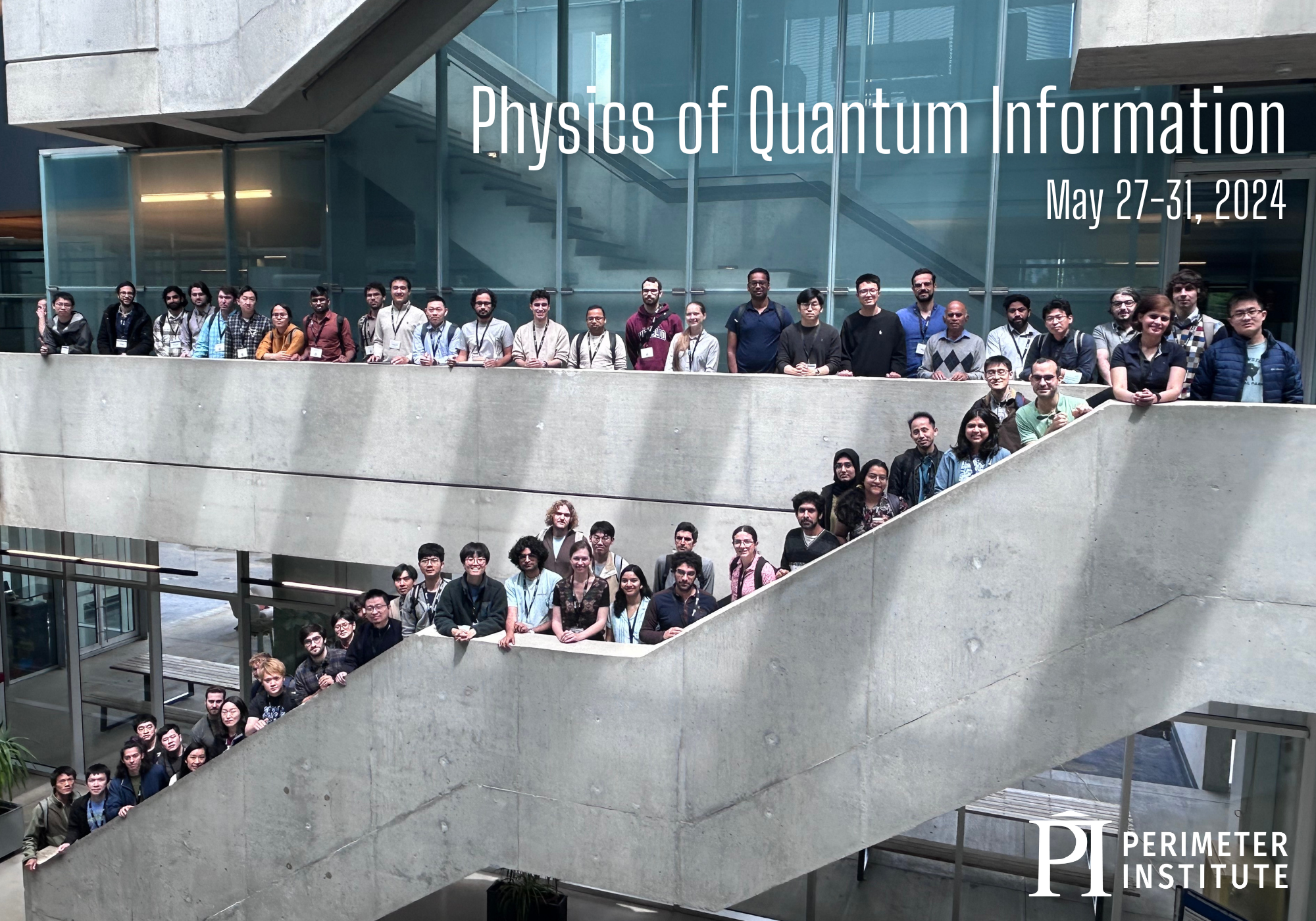
-
Foundations of Quantum Computational Advantage
21 talks-Collection NumberC24020The workshop marks the halfway point of the similarly named (FoQaCiA, pronounced "focaccia") collaboration between researchers in Canada and Europe, funded as part of a flagship partnership between NSERC and Horizon Europe.
https://www.foqacia.org/
The goal of FoQaCiA is to develop new foundational approaches to shed light on the relative computational power of quantum devices and classical computers, helping to find the "line in the sand" separating tasks admitting a quantum speedup from those that are classically simulable.
The workshop will focus on the four central interrelated themes of the project:
1. Quantum contextuality, non-classicality, and quantum advantage
2. The complexity of classical simulation of quantum computation
3. The arithmetic of quantum circuits
4. The efficiency of fault-tolerant quantum computation
Our view is that the future success of quantum computing critically depends on advances at the most fundamental level, and that large-scale investments in quantum implementations will only pay off if they can draw on additional foundational insights and ideas
:: :: ::
Scientific Organizers:
Rui Soares Barbosa (INL - International Iberian Nanotechnology Laboratory)
Anne Broadbent (University of Ottawa)
Ernesto Galvão (INL - International Iberian Nanotechnology Laboratory)
Rob Spekkens (Perimeter Institute)
Jon Yard (Perimeter Institute):: :: ::
FoQaCiA is funded by:


-
-
QPV 2023: Advances in quantum position verification
12 talks-Collection NumberC23037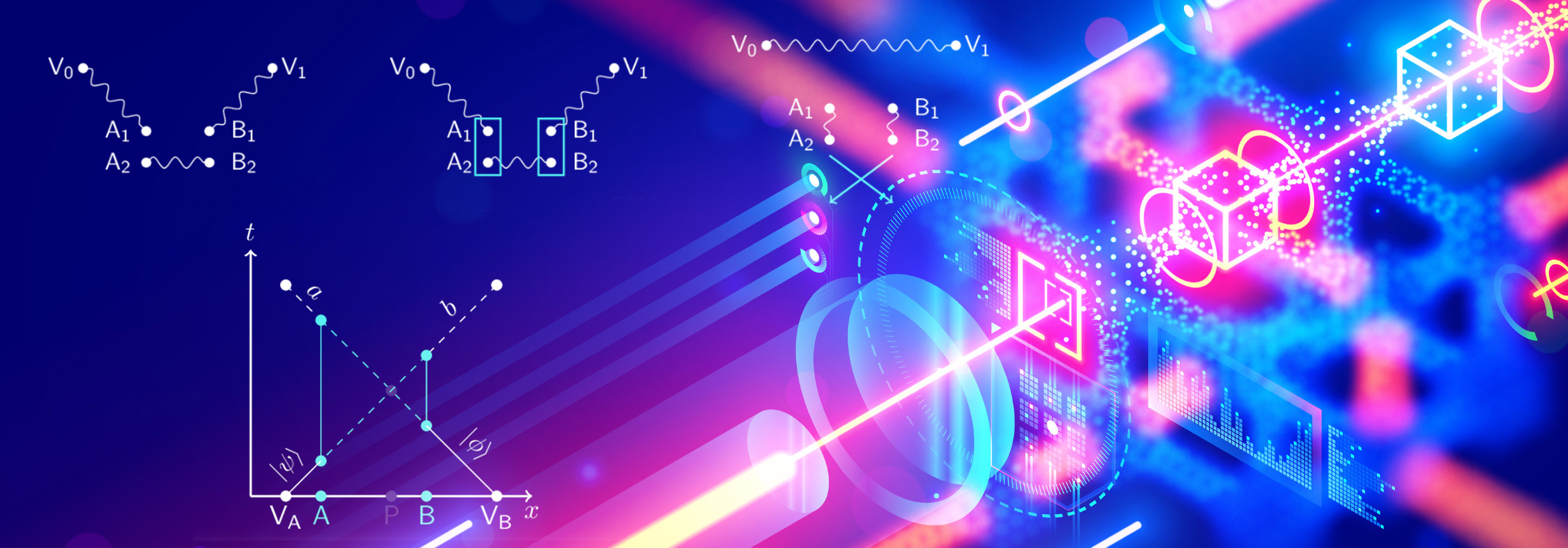
Quantum position verification (QPV) schemes use the properties of quantum information and the relativistic signalling bound to verify the location of an object (sometimes called a “tag”) to distant observers in an environment that may contain would-be spoofers. The guarantee is based on the assumptions of the underlying security model; various theoretically and practically interesting security models have been proposed. The area is attracting increasing interest, with new theoretical developments in security analyses, emerging experimental studies of QPV systems, and recently discovered surprising and intriguing connections to topics in quantum gravity. A workshop on QPV will be held at the Perimeter Institute for Theoretical Physics.
The workshop will cover topics related to all aspects of QPV, including, but not limited to:
- Theoretical developments related to the security of QPV schemes, including development or refinement of security models, proofs of security within given models, tradeoffs between security and efficiency, and Experimental studies of QPV and theoretical work aimed at developing practical QPV schemes.
- QPV’s relationship to other cryptographic tasks and primitives.
- QPV’s relationship to holography and quantum gravity.

Territorial Land Acknowledgement
Perimeter Institute acknowledges that it is situated on the traditional territory of the Anishinaabe, Haudenosaunee, and Neutral peoples.
Perimeter Institute is located on the Haldimand Tract. After the American Revolution, the tract was granted by the British to the Six Nations of the Grand River and the Mississaugas of the Credit First Nation as compensation for their role in the war and for the loss of their traditional lands in upstate New York. Of the 950,000 acres granted to the Haudenosaunee, less than 5 percent remains Six Nations land. Only 6,100 acres remain Mississaugas of the Credit land.
We thank the Anishinaabe, Haudenosaunee, and Neutral peoples for hosting us on their land.
-
New Frontiers in Machine Learning and Quantum
10 talks-Collection NumberC22034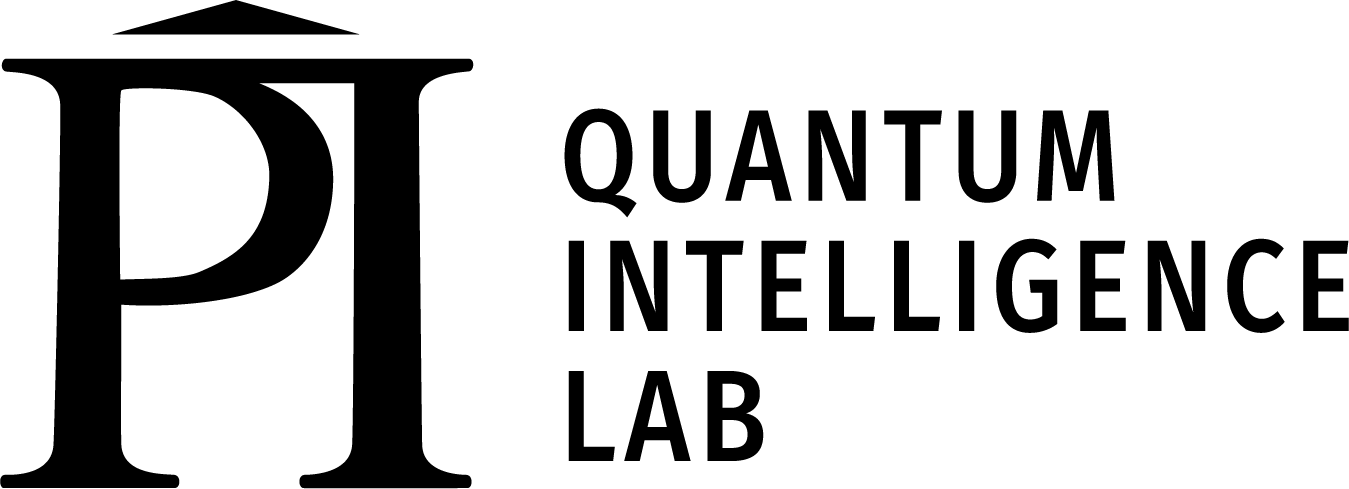
This workshop will bring together a group of young trendsetters working at the frontier of machine learning and quantum information. The workshop will feature two days of talks, and ample time for participants to interact and form new collaborations in the inspiring environment of the Perimeter Institute. Topics will include machine learning, quantum field theory, quantum information, and unifying theoretical concepts.
Territorial Land AcknowledgementPerimeter Institute acknowledges that it is situated on the traditional territory of the Anishinaabe, Haudenosaunee, and Neutral peoples.
Perimeter Institute is located on the Haldimand Tract. After the American Revolution, the tract was granted by the British to the Six Nations of the Grand River and the Mississaugas of the Credit First Nation as compensation for their role in the war and for the loss of their traditional lands in upstate New York. Of the 950,000 acres granted to the Haudenosaunee, less than 5 percent remains Six Nations land. Only 6,100 acres remain Mississaugas of the Credit land.
We thank the Anishinaabe, Haudenosaunee, and Neutral peoples for hosting us on their land.
-
Cold Atom Molecule Interactions (CATMIN)
22 talks-Collection NumberC22028In the first edition of the meeting, CATMIN (Cold ATom Molecule INteractions) was a new satellite meeting of ICPEAC devoted to the study of atomic and molecular systems, where long-range interactions and the extreme properties of highly excited electrons produce new physics and lead to new technologies. CATMIN's objective is to strengthen the links between cold atom physics, molecular physics, chemistry and condensed matter physics, so that new concepts and breakthroughs can emerge. Ions, atoms and molecules are naturally made quantum systems that can be controlled with light and low frequency electromagnetic fields, thus lending themselves to precision investigations and use in quantum technologies. The second CATMIN conference will be held a few days before the ICAP, which is a major conference in AMO physics, with the idea that scientists can attend both meetings. The CATMIN meeting will be a two-day conference held at the Perimeter Institute in Waterloo, ON, centered on Rydberg-atom physics, cold ion physics and the interplay between these experimental platforms. Rydberg atom physics is experiencing a renaissance due to the application of the exaggerated properties of highly excited atoms for quantum information and quantum simulation. Rydberg states can even be observed in solids which is a subject of increasing interest. Cold ions, similarly, are exciting for quantum simulation and computing, becoming one of the central platforms in the race to build a quantum computer. Many exciting developments are also in progress in the area of cold-molecules. Long-range interactions open up fields of research such as the photo-association of cold atoms to form ultra-cold molecules, and the excitation of Rydberg molecules demonstrating novel kinds of molecular bonding. Strong long-range interactions in all the systems permit the investigation of the few-body and many-body regimes, including the few- to many-body transition. The conference aims to share the latest developments and results in these exciting fields among the various ICAP communities as well as the broader physics and chemistry communities. Overall, the conference can forward quantum science and the application of quantum science, which furthers these fields of research by concentrating interest to attract people and resources to the field.
Sponsorship for this event has been provided by:

Perimeter Institute will make every effort to host the conference as an in-person event. However, we reserve the right to change to an online program to align with changes in regulations due to the COVID-19 pandemic.
Territorial Land Acknowledgement
Perimeter Institute acknowledges that it is situated on the traditional territory of the Anishinaabe, Haudenosaunee, and Neutral peoples.
Perimeter Institute is located on the Haldimand Tract. After the American Revolution, the tract was granted by the British to the Six Nations of the Grand River and the Mississaugas of the Credit First Nation as compensation for their role in the war and for the loss of their traditional lands in upstate New York. Of the 950,000 acres granted to the Haudenosaunee, less than 5 percent remains Six Nations land. Only 6,100 acres remain Mississaugas of the Credit land.
We thank the Anishinaabe, Haudenosaunee, and Neutral peoples for hosting us on their land.
-
Quantum Information 2021/2022
10 talks-Collection NumberC22016We will review the notion of entanglement in quantum mechanics form the point of view of information theory, and how to quantify it and distinguish it from classical correlations. We will derive Bell inequalities and discuss their importance, and how quantum information protocols can use entanglement as a resource. Then we will analyze measurement theory in quantum mechanics, the notion of generalized measurements and quantum channels and their importance in the processing and transmission of information. We will introduce the notions of quantum circuits and see some of the most famous algorithms in quantum information processing, as well as in quantum cryptography. We will also talk about the notion of distances and fidelity between states from the point of view of information theory and we will end with a little introduction to the notions of relativistic quantum information. -
Quantum Gravity 2020
22 talks-Collection NumberC20031
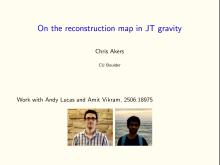
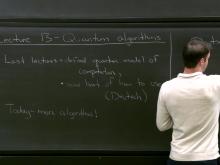
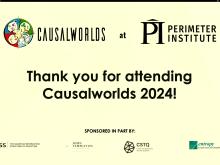
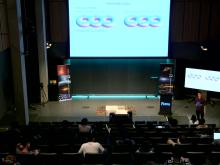

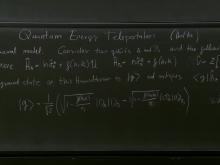
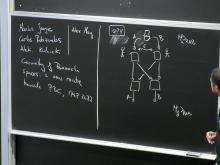
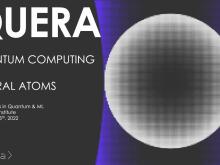
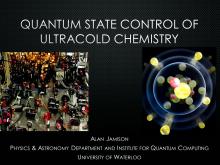
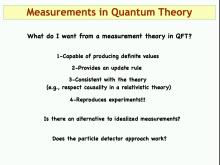
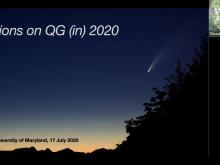

.png)
